Papers by Saúl Domínguez-Isidro
Programming and Computer Software, Dec 1, 2022

Trudy Instituta sistemnogo programmirovaniâ, 2022
The learning customization and monitoring are considered key aspects of the teaching-learning pro... more The learning customization and monitoring are considered key aspects of the teaching-learning processes. Some works have proposed mobile learning systems that provide teachers and students learning monitoring and personalization services. One of the main requirements of these kinds of systems in terms of software quality is usability; however, few works have addressed the usability issues using laboratory studies with users in real domains. In this work, we present a usability evaluation of the learning monitoring and personalization services of a mobile learning platform based on a laboratory study in which nine teachers and ten students participated. In our usability evaluation, the aspects evaluated were effectiveness, efficiency, and level of user satisfaction as proposed by the ISO/IEC 25000 family of standards. The results show that the teachers presented effectiveness, efficiency, and satisfaction considered satisfactory, while the students presented effectiveness and satisfaction classified as satisfactory and acceptable efficiency. The usability evaluation described in this work can serve as a reference for developers seeking to improve learning monitoring and personalization services development.
Springer eBooks, Oct 30, 2022
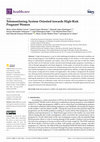
Healthcare
A high-risk pregnancy is one in which pathological problems or abnormal conditions are latent dur... more A high-risk pregnancy is one in which pathological problems or abnormal conditions are latent during pregnancy and childbirth, increasing dangers to the mother’s or the infant’s health. Based on international standards and studies, most of the harms and risks to both the mother and the infant can be detected, treated, and prevented through proper pregnancy monitoring, as well as through appropriate and timely diagnosis. In this paper, we present the analysis, design, development, and usability assessment of a telemonitoring system focused on the remote monitoring and control of pregnancy in women suffering from hypertension, diabetes, or high-risk pregnancy. Our system is composed of two mobile web applications. One of these is designed for the medical area, allowing remote monitoring of the patient’s pregnancy, and the other one is directed towards the patient, who enters the alarm symptom data, hypertension data, diabetes data, and clinical analyses, allowing the detection of a ri...
Proceedings of the Genetic and Evolutionary Computation Conference Companion, Jul 15, 2017
This paper presents a memetic algorithm for solving constrained numerical optimization problems. ... more This paper presents a memetic algorithm for solving constrained numerical optimization problems. The proposed approach uses differential evolution as a global search algorithm, which was improved with a mathematical programming method called Powell's conjugate direction as a local search operator. To the best of the authors' knowledge, this is the first attempt to use such mathematical programming method within differential evolution for constrained optimization. The proposed algorithm was tested on 36 test problems used in the special session on "Single Objective Constrained Real-Parameter Optimization" in CEC'2010. The proposed algorithm is able to find competitive results with respect to the winner algorithm in that session.
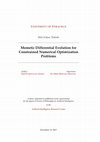
The object of study of this dissertation is Memetic Differential Evolution Algorithms (MDEs) for ... more The object of study of this dissertation is Memetic Differential Evolution Algorithms (MDEs) for constrained numerical optimization problems (CNOPs). MDEs are one of the most used approaches to improve the performance of the standard differential evolution (DE) for the solution of numerical optimization problems, which are present in real-world applications, often in engineering problems. As it is well known, memetic approaches are characterized by the inclusion of search operators within the cycle of an evolutionary algorithm, improving the search process on a broader range of problems, due to the synergy between the global and local search operator. However, the coordination among the algorithmic components is an issue in the design part of a memetic algorithm, since the excessive use of the local search operator could affect the efficiency of the algorithm. Therefore, three main studies of the effects of local search operators in MDE schemes are carried out. The first study analyzes the relationship between the performance of the local search operator within an MDE and its final results in CNOPs by adopting an improvement index measure, which indicates the rate of fitness improvement made by the local search operator. The second study analyzes the influence of the depth of direct local search methods within MDE when solving CNOPs. Finally, the third study analyzes the Baldwin effect and Lamarckian learning on an MDE that solves CNOPs. Derived from the assessments mentioned above, we propose a coordination mechanism of multiple local search operators for a multimeme scheme based on Differential Evolution (MmDE) that solves CNOPs. The proposed approach associates a pool of direct local search operators within the standard Differential Evolution. The coordination mechanism consists of a probabilistic method based on a cost-benefit scheme, and it is aimed to regulate the activation probability of every local search operator during the evolutionary cycle of the global search. For all implementations, the εconstrained method is used as constraint-handling technique. All experiments are tested on thirty-six well-known benchmark problems. v Finally, I want to acknowledge support from CONACYT through project No. 220522, and the University of Veracruz to pursue PhD studies.
This paper presents the use of an evolutionary metaheuristic algorithm called evolutionary progra... more This paper presents the use of an evolutionary metaheuristic algorithm called evolutionary programming to minimize the length of addition chains, which is an NP-hard problem. Addition chains are used in modular exponentiation for data encryption and decryption public-key cryptosystems, such as RSA, DSA and others. The algorithm starts with a population of feasible addition chains. After that, the combination of a mutation operator, which allows each individual to generate a feasible offspring, and a replacement process based on stochastic encounters provides a simple approach which is tested on exponents with different features. The proposed algorithm is able to find competitive results with respect to other nature-inspired metaheuristic approaches but with a lower number of evaluations per run.

This paper analyzes the influence of the depth of direct local search methods in constrained nume... more This paper analyzes the influence of the depth of direct local search methods in constrained numerical optimization problems in order to use as a local search operator (LSO) within a memetic algorithm. To perform this study, five direct local search methods (Random Walk, Simulated Annealing, Nelder-Mead, Hooke-Jeeves, and Hill Climber) are implemented separately to analyze their behavior within constrained search spaces by using a proposed measure named proximity rate, which measures the closeness of the solutions found by the LSO and the known optimal solution. Finally, all methods are used as LSO, separately, in a memetic algorithm based on Differential Evolution (MDE) structure, where the best solution in the population is used to exploit promising areas in the search space by the aforementioned LSOs. The comparative analysis has been performed on twenty-four benchmark problems used in the special session on “Single Objective Constrained Real-Parameter Optimization” in CEC'2006. Numerical results show that there is not a negative influence of LSO's depth within MDE approach; since regardless of the number of fitness evaluations allowed during the LSO search process, the MDE approach obtains competitive results.
Swarm and evolutionary computation, Apr 1, 2018
This paper introduces an adaptive local search coordination for a multimeme Differential Evolutio... more This paper introduces an adaptive local search coordination for a multimeme Differential Evolution to constrained numerical optimization problems. The proposed approach associates a pool of direct local search operators within the standard Differential Evolution. The coordination mechanism consists of a probabilistic method based on a cost-benefit scheme, and it is aimed to regulate the activation probability of every local search operator during the evolutionary cycle of the global search. Also, the method adopts the ε-constrained method as a constraint-handling technique. The proposed approach is tested on thirtysix well-known benchmark problems. Numerical results show that the proposed method is suitable to coordinate a set of local search operators adequately within a memetic scheme for constrained search spaces.
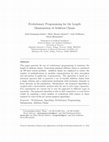
Engineering Applications of Artificial Intelligence, 2015
This paper presents the use of evolutionary programming to minimize the length of addition chains... more This paper presents the use of evolutionary programming to minimize the length of addition chains. Generating minimal addition chains is considered an NP-hard search problem. Addition chains are employed to reduce the number of multiplications in modular exponentiation for data encryption and decryption in public-key cryptosystems. The algorithm is based on a mutation operator able to generate a set of feasible addition chains from a single solution and a replacement mechanism with stochastic elements to favor diversity in the population. Furthermore, the proposed algorithm is coupled with a deterministic method with the aim to solve large exponents. Five experiments are carried out to test the approach in different types of exponents. The proposed algorithm is able to find competitive or even better results by requiring a lower number of evaluations with respect to those required by state-of-the-art nature-inspired algorithms.

2019 IEEE International Autumn Meeting on Power, Electronics and Computing (ROPEC), 2019
Memetic approaches are composed of three general processes, a global optimizer, a set of local-se... more Memetic approaches are composed of three general processes, a global optimizer, a set of local-search operators, and a coordination mechanism; which are defined depending on the problem to be optimized. For constrained optimization problems (COPs), memetic algorithms require the incorporation of a constraint handler that guides the search to the feasible regions of the search space. In this regard, the epsilon-constrained method has demonstrated to operate correctly in memetic approaches by transforming a COP into an unconstrained problem during a certain period of the search process. This constraint handler uses a tolerance level that promotes the exploration, mainly in COPs where there are disjoint feasible regions or equality constraints. Nevertheless, epsilon-constrained depends on a set of parameters that determine its behavior, so five variants have emerged in the control of its tolerance, (1) static, (2) dynamic, (3) truncated, (4) threshold, and (5) adaptive. This study focuses on determining the most appropriate control technique in a memetic approach and its relation to the performance and final results of the algorithm. For the study, a memetic differential evolution (MDE) is implemented, whose coordination mechanism controls the activation of three local search methods. Each epsilon-level control mechanism is incorporated separately within the MDE and is tested in eighteen well-known test problems. The results suggest that there is a benefit through the use of adaptive/dynamic mechanisms while reducing the budget for fitness evaluations. Likewise, its advantage is exhibited in functions with non-separable equality constraints. Finally, results determine that there is no benefit relationship between how to control the epsilon-level and the performance of the local optimizers used in this study.

Journal of Intelligent & Fuzzy Systems, 2021
This paper presents the technical proposal of a novel approach based on Ant Colony Optimization (... more This paper presents the technical proposal of a novel approach based on Ant Colony Optimization (ACO) to recommend personalized microlearning paths considering the learning needs of the learner. In this study, the information of the learner was considered from a disciplinary ICT perspective, since the characteristics of our learner correspond to those of a professor with variable characteristics, such as the level of knowledge and their learning status. The recommendation problem is approached as an instance of the Traveling Salesman Problem (TSP), the educational pills represent the cities, the paths are the relationships between educational pills, the cost of going from one pill to another can be estimated by their degree of difficulty as well as the performance of the learner during the individual test. The results prove the approach proposal capacity to suggest microlearning path personalized recommendation according to the different levels of knowledge of the learners. The high...
Proceedings of the Genetic and Evolutionary Computation Conference Companion, 2017
This paper presents a memetic algorithm for solving constrained numerical optimization problems. ... more This paper presents a memetic algorithm for solving constrained numerical optimization problems. The proposed approach uses differential evolution as a global search algorithm, which was improved with a mathematical programming method called Powell's conjugate direction as a local search operator. To the best of the authors' knowledge, this is the first attempt to use such mathematical programming method within differential evolution for constrained optimization. The proposed algorithm was tested on 36 test problems used in the special session on "Single Objective Constrained Real-Parameter Optimization" in CEC'2010. The proposed algorithm is able to find competitive results with respect to the winner algorithm in that session.
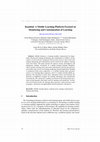
iJET, 2021
For the new educational models, it is essential to include teaching strategies that allow student... more For the new educational models, it is essential to include teaching strategies that allow students to customize their learning based on their competencies, skills, and preferences, as well as strategies that support individual monitoring of student learning. However, the implementation of these strategies in teaching is complex for professors, and it gets complicated, as the number of students in the class-room increases. In this work, the design and development of a mobile learning platform are presented, which provides the professor and student with multiple services for the learning monitoring and customization based on learning styles, context information, and mobile learning objects. Our platform is composed of three main components: (1) A mobile learning object generator system, (2) A learning object repository, and (3) A student-oriented mobile application. The in-tegration of these three components allows and facilitates the professor the im-plementation of various strategie...

2018 6th International Conference in Software Engineering Research and Innovation (CONISOFT), 2018
Mobile Health (mHealth) systems are a growing field that allows optimizing monitor several patien... more Mobile Health (mHealth) systems are a growing field that allows optimizing monitor several patients chronic diseases, enhancing response times concerning patients health conditions. Due to the architecture of this type of systems, the security is an important matter for protecting the patient information privacy. Based on the Official Mexican Standard guidelines NOM-024-SSA3-2010, this paper presents the development of a security layer over a mHealth system aimed toward patients with Chronic Kidney Disease in peritoneal dialysis therapy, which was developed in the National Laboratory on Advanced Informatics in collaboration with the Regional Hospital Zone No. 11 of the “Instituto Mexicano del Seguro Social” (IMSS). The proposed security layer is designed to protect two system elements: 1) Patient information and 2) Server availability. To achieve this, a symmetric encryption algorithm, Advanced Encryption Standard (AES), is implemented in the services offered by the system to preser...
Swarm and Evolutionary Computation, 2018
This paper introduces an adaptive local search coordination for a multimeme Differential Evolutio... more This paper introduces an adaptive local search coordination for a multimeme Differential Evolution to constrained numerical optimization problems. The proposed approach associates a pool of direct local search operators within the standard Differential Evolution. The coordination mechanism consists of a probabilistic method based on a cost-benefit scheme, and it is aimed to regulate the activation probability of every local search operator during the evolutionary cycle of the global search. Also, the method adopts the ε-constrained method as a constraint-handling technique. The proposed approach is tested on thirtysix well-known benchmark problems. Numerical results show that the proposed method is suitable to coordinate a set of local search operators adequately within a memetic scheme for constrained search spaces.
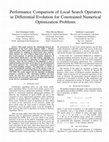
2014 IEEE Symposium on Differential Evolution (SDE), 2014
This paper analyzes the relationship between the performance of the local search operator within ... more This paper analyzes the relationship between the performance of the local search operator within a Memetic Algorithm and its final results in constrained numerical optimization problems by adapting an improvement index measure, which indicates the rate of fitness improvement made by the local search operator. To perform this analysis, adaptations of Nealder-Mead, Hooke-Jeeves and Hill Climber algorithms are used as local search operators, separately, in a Memetic DEbased structure, where the best solution in the population is used to exploit promising areas in the search space by the aforementioned local search operators. The ε-constrained method is adopted as a constraint-handling technique. The approaches are tested on thirty six benchmark problems used in the special session on "Single Objective Constrained Real-Parameter Optimization" in CEC'2010. The results suggest that the algorithm coordination proposed is suitable to solve constrained problems and those results also show that a poor value of the improvement index measure does not necessarily reflect on poor final results obtained by the MA in a constrained search space.
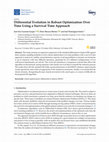
Mathematical and Computational Applications, 2020
This study presents an empirical comparison of the standard differential evolution (DE) against t... more This study presents an empirical comparison of the standard differential evolution (DE) against three random sampling methods to solve robust optimization over time problems with a survival time approach to analyze its viability and performance capacity of solving problems in dynamic environments. A set of instances with four different dynamics, generated by two different configurations of two well-known benchmarks, are solved. This work also introduces a comparison criterion that allows the algorithm to discriminate among solutions with similar survival times to benefit the selection process. The results show that the standard DE holds a good performance to find ROOT solutions, improving the results reported by state-of-the-art approaches in the studied environments. Finally, it was found that the chaotic dynamic, disregarding the type of peak movement in the search space, is a source of difficulty for the proposed DE algorithm.
Engineering Applications of Artificial Intelligence, 2015
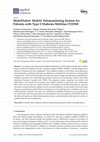
Applied Sciences
According to the International Diabetes Federation, in 2019, approximately 416.7 million people w... more According to the International Diabetes Federation, in 2019, approximately 416.7 million people worldwide suffered from type 2 diabetes mellitus (T2DM). T2DM is a chronic degenerative disease of long term and slow progression. This condition requires a strict follow-up by physicians and nutritionists, combined with rigorous adherence to treatment by the patient to avoid possible complications. In this context, this paper describes the analysis, design, development, and preliminary usability assessment of a telemonitoring system focused on the monitoring, control, and remote nutritional therapy of people with T2DM. The proposed system comprises two mobile web applications, one focused on the patient and another oriented to physicians and nutritionists. The central services that our system provides to the patient and health personnel are: generate risk alerts; consult food menu options; receive recommendations; consult results of the food intake frequency questionnaire; patient histor...











Uploads
Papers by Saúl Domínguez-Isidro